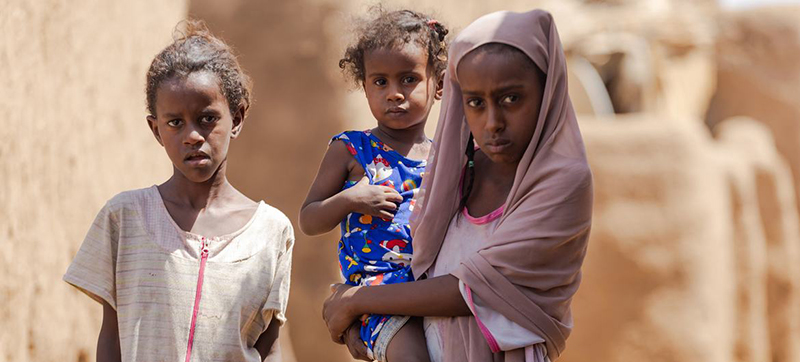 Sudan
Sudan
The risk of widespread famine in Sudan caused by war there was confirmed on Thursday by leading hunger experts who warned that the country faces “the worst levels of acute food insecurity ever recorded”, with no less than 14 areas at the highest level of risk.
According to the latest UN-backed Integrated Food Security Phase Classification (IPC) initiative, over half the population in Sudan – 25.6 million people – face “crisis or worse” conditions between now September 2024, coinciding with the lean season. Learn more about famine and the IPC's five levels of food security in our explainer here.
Even worse, 755,000 people face phase five “catastrophic” conditions in 10 states, including in Greater Darfur as well as South and North Kordofan, Blue Nile, Al Jazira and Khartoum.
At the same time, 8.5 million people – 18 per cent of the population – now suffer from phase four “emergency” levels of food insecurity.
Warring generals
In the more than 14 months since rival militaries – the Sudan Armed Forces and the Rapid Support Forces – unleashed their heavy weapons arsenals on one another amid rising tensions over a transition to civilian rule, the UN has repeatedly called for a ceasefire as the country’s capital, Khartoum, became a battleground and amid fears of atrocities in the Darfurs.
Despite multiple calls for a ceasefire to Generals Abdel-Fattah Burhan, head of the Sudanese military, and Mohammed Hamdan Dagalo, who heads the Rapid Support Forces, senior UN humanitarians have warned that the situation is only getting worse.
Conflict leaves country reeling
“We have received news of people eating leaves from trees; one mother cooked up dirt just to put something in her children’s stomach,” said Justin Brady, head of the UN emergency relief agency (OCHA) in Sudan, in an interview with UN News.
The risk of famine threatens residents, people uprooted by the war and refugees in no less than 14 areas covering Greater Darfur, Greater Kordofan, Al Jazira states and hotspots in Khartoum “if the conflict escalates further, including through increased mobilisation of local militias that further disrupt mobility, humanitarian assistance, market and livelihood activities”, the IPC assessment warned.
Tweet URL
Responding to the IPC findings, three UN agency heads warned that the looming hunger catastrophe was “on a scale not seen since the Darfur crisis in the early 2000s”, a reference to years of brutal fighting and increasing atrocities there that left some 300,000 people dead and millions of others displaced.
Unlike the Darfur crisis then, today’s emergency spans the whole country, with catastrophic levels of hunger even reaching Khartoum and Gezira state, once Sudan’s breadbasket.
Daily struggle to eat
In an alert, the UN Food and Agriculture Organization (FAO), the UN Children’s Fund (UNICEF) and the UN World Food Programme (WFP) said that “for half of Sudan’s war-battered population, every single day is a struggle to feed themselves and their families.”
The agency chiefs highlighted that this is the first time that catastrophic phase five conditions have been confirmed in Sudan since the IPC’s inception in 2004, while children bear the brunt of the “rapid deterioration” in food security that has been “torn apart” by 14 months of war between rival militaries.
The three agencies have repeatedly warned about the crisis and already mobilised a large-scale humanitarian response inside Sudan and in neighbouring countries, where more than two million refugees have sought safety.
End the fighting
“An immediate ceasefire and renewed international efforts, both diplomatic and financial, as well as unhindered and sustained humanitarian access are urgently needed to enable the humanitarian response to be further expanded and to allow the agencies to deliver at the speed needed,” they insisted.
This new data shows a stark deterioration in food security in Sudan compared with the last IPC report in December 2023, which showed 17.7 million people facing acute hunger, indicated by IPC phase three and higher.
This included nearly five million people in emergency levels of hunger (IPC phase four) whereas today’s assessment indicates that number to have risen to 8.5 million.
“The new IPC analysis revealed a deepening and rapid deterioration of the food security situation in Sudan with millions of people’s lives at risk,” said FAO Director-General QU Dongyu. “We are now delivering lifesaving seeds for the main planting season. The clock is ticking for Sudan’s farmers."
FAO urgently requires $60 million to meet unfunded parts of its famine prevention plan to ensure that people, especially those in inaccessible areas, are able to produce food locally and avert food shortages in the next six months.
“We must act collectively, at scale, with unimpeded access, for the sake of millions of innocent lives hanging in the balance,” he said.
Support Our Journalism
We cannot do without you.. your contribution supports unbiased journalism
IBNS is not driven by any ism- not wokeism, not racism, not skewed secularism, not hyper right-wing or left liberal ideals, nor by any hardline religious beliefs or hyper nationalism. We want to serve you good old objective news, as they are. We do not judge or preach. We let people decide for themselves. We only try to present factual and well-sourced news.





